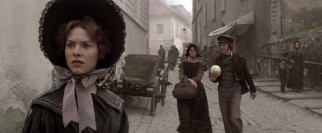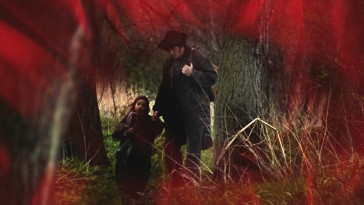Les Misérables (1998) Blu-ray Review
 |
Les Misérables
Theatrical Release: May 1, 1998 / Running Time: 134 Minutes / Rating: PG-13 Director: Bille August / Writers: Rafael Yglesias (screenplay); Victor Hugo (novel Les Misérables) Cast: Liam Neeson (Jean Valjean), Geoffrey Rush (Inspector Javert), Uma Thurman (Fantine), Claire Danes (Cosette), Hans Matheson (Marius Pontmercy), Reine Brynolfsson (Captain Beauvais), Peter Vaughan (Bishop Myriel), Jon Kenny (Thénardier), Gillian Hanna (Mme. Thénardier), Shane Hervey (Gavroche), John McGlynn (Carnot), Lennie James (Enjolras), Kathleen Byron (Mother Superior), Edward Tudor-Pole (Landlord), Mimi Newman (Cosette - Aged 8), Sylvie Koblizkova (Éponine), Tim Barlow (Lafitte), Patsy Byrne (Toussaint), Toby Jones (Doorkeeper) |
Buy Les Misérables (1998) from Amazon.com: Blu-ray • DVD • Instant Video
It is unlikely for you ever to be able to say the words "Les Misérables" and have people know that you are talking about the 1998 dramatic film. The title more obviously calls to mind Victor Hugo's 19th century novel, the highly successful and long-running 1980s stage musical, and now the major feature film adaptation that will open in theaters on Christmas Day. Shot in the Czech Republic and France, this international 1998 production was the twelfth feature film adaptation of Hugo's historical novel. They began as early as a 1909 American silent movie. A new version was then rolled out almost every decade, if not in America then in France and once in Italy. Currently, the 1998 version is the second most voted-on title in Hugo's 160-credit IMDb filmography, trailing only Disney's 1996 animated musical The Hunchback of Notre Dame. The classic 1939 Hollywood version of Hunchback starring Charles Laughton and Maureen O'Hara comes third and a variety of Les Mis, Hunchback, and other adaptations follow, only a few in the 1,000+ vote range that could defend an old movie against "obscurity" claims. Wielding Broadway clout and the star power of Hugh Jackman, Russell Crowe, and Anne Hathaway, Universal Pictures' big wide release is certain to overtake the 1998 version in visibility and votes. Already at just a 7.6, however, it remains to be seen whether it will be able to best the 1998 movie's 7.3 average user rating.
Unlike 2012's incarnation, this 1998 film did not have Oscar bait written all over it. It opened on May 1st, far from awards consideration. Instead of coming from a filmmaker whose last movie had won Picture and Director Oscars, this version hailed from Bille August, a Danish cinematographer turned director with few English language credits (among them, The House of the Spirits and Smilla's Sense of Snow), who would subsequently return to working in his native Scandinavia. Hugo's novel was adapted by Rafael Yglesias, a novelist whose promising screenwriting credits included the adaptation of his own book Fearless for Peter Weir and of the play that would become Roman Polanski's Death and the Maiden.
As you very well may know, Les Mis is set in the decades following the French Revolution and tells the story of Jean Valjean (Liam Neeson), a convict who has just served nineteen hard years of imprisonment in the galleys. The only one who will accept Valjean into his home for food and temporary shelter is an old bishop (Peter Vaughan). Valjean shows his gratitude by stealing the Bishop's silverware. Practicing what he preaches, the Bishop tells authorities that the convict has not committed theft but simply accepted them as gifts, sparing Valjean another prison sentence.
We jump ahead nine years to find that Valjean has taken that display of humanity to heart and used it to give himself a new life. Valjean is now called Monsieur le Maire and, despite limited literacy, he is both a factory owner and the mayor of the small town Vigau. Taking notice of the mayor at first glimpse is the newly-installed Inspector Javert (Geoffrey Rush), a man who recognizes le Maire as Valjean from his days as a prison guard. The by-the-book Javert does not have concrete evidence to support his memories, but Valjean nonetheless has to confront his former life when accusations attribute it to an innocent idiot (John McGlynn).
Meanwhile, Valjean seizes an opportunity for compassion regarding Fantine (a clammy Uma Thurman), a worker at his factory who is dismissed upon the discovery that she has a child out of wedlock. The job loss intensifies the already considerable financial strain on Fantine, who resorts to prostitution to keep a roof over her head. Javert is ready to unfairly sentence Fantine to six months in prison for defending herself against rowdy pedestrians. Exerting his mayoral authority, Valjean gets Fantine a reprieve and gives her a bed to rest her sickly head.
Valjean's thoughtfulness extends to Cosette, Fantine's young illegitimate daughter, who he adopts as his own. The two find shelter in a convent where they spend the next decade. Cosette grows up (into Claire Danes) and draws the interest of Marius (Hans Matheson), the leader of a young revolutionary movement eager to see France freed from its monarchy status. That association causes the paths of the past-hiding Valjean and the determined Javert to cross once more.
There is no singing in this version and that is by far the biggest difference between this film and its present-day namesake. Hugo's intimate epic unfolds a lot more convincingly with spoken word than with live-recorded song. It still relies heavily on coincidence, but the plot specifics are much clearer in this form. The politics that shape the film's second half remain more vague than they should be, although that helps this film be more of a human drama than an historical one.
Neeson is a compelling lead. Rush is a worthy adversary. August's direction may be ordinary, but it serves the material well. And Yglesias' screenplay, more concerned with dialogue that is captivating than chronistic, An underperformer in theaters, where its fourth place opening weekend gross was just $1 million more than Titanic's twentieth weekend showing, the '98 Les Mis didn't advance careers or land a single major award nomination. Nonetheless, as that very respectable IMDb rating shows, the public still thinks rather well of this incarnation. Wisely, Sony Pictures Home Entertainment thought to time the film's Blu-ray debut to the musical film's theatrical release. While the latter is a week away from public consumption, the 1998 movie is now available to own in high definition.
VIDEO and AUDIO Les Misérables is spotless, sharp enough, and very nice-looking in its 2.40:1 Blu-ray presentation. Likewise, the 5.1 DTS-HD master audio leaves nothing to be desired, distributing strong sound effects, evenly-distributed elements, and a good amount of atmosphere. Both the picture and sound are better than you'd expect for a '90s film, but that shouldn't be a huge surprise, since Sony provides some of the most reliably pleasing transfers out there.
BONUS FEATURES, MENUS, PACKAGING and DESIGN This Blu-ray includes just a single bonus feature: "A First Look at Les Misérables." Though that title made me suspect an HBO First Look special, it is in fact just a short promotional EPK-ready making-of, running 3 minutes and 36 seconds and appearing in 1.33:1 standard definition (with movie clips letterboxed). A second and perhaps more significant bonus feature is found inside the side-snapped case (which per the studio is fitted with nice double-sided artwork): an insert with directions and a unique code for accessing the complimentary UltraViolet stream and download of the film, which promises at least two years for you to redeem this. The menu blends clips from the movie with red curtains, a motif whose significance eludes me. Being a Sony disc, this gladly both supports bookmarks and resumes playback.
CLOSING THOUGHTS The fairly well-made 1998 Les Misérables hits Blu-ray with strong picture and sound but almost no bonus features. As a film of questionable replay value and a disc that isn't too competitively priced (plus currently selling for three times as much as the DVD), fans will probably be okay waiting for a price drop before adding this to their collection, unless the new musical makes them ravenous to revisit this prior adaptation. Buy Les Misérables from Amazon.com: Blu-ray / DVD / Instant Video
|
Related Reviews:
DVDizzy.com | DVD and Blu-ray Reviews | New and Upcoming DVD & Blu-ray Schedule | Upcoming Cover Art | Search This Site
New to Blu-ray: eXistenZ • Francis Ford Coppola: 5-Film Collection • Beasts of the Southern Wild • The Dark Knight Rises
Based on Victor Hugo: The Hunchback of Notre Dame • Wishbone | Written by Rafael Yglesias: Dark Water
Liam Neeson: Unknown • After.Life • Chloe • Battleship • The Chronicles of Narnia: The Lion, The Witch and The Wardrobe
Geoffrey Rush: The King's Speech • Elizabeth: The Golden Age • Pirates of the Caribbean: On Stranger Tides
Uma Thurman: Percy Jackson & the Olympians: The Lightning Thief | Claire Danes: John Grisham's The Rainmaker • Stardust
Late 1990s on Blu-ray: Men in Black • Rushmore • The Game • Fear and Loathing in Las Vegas • Jackie Brown • Following








